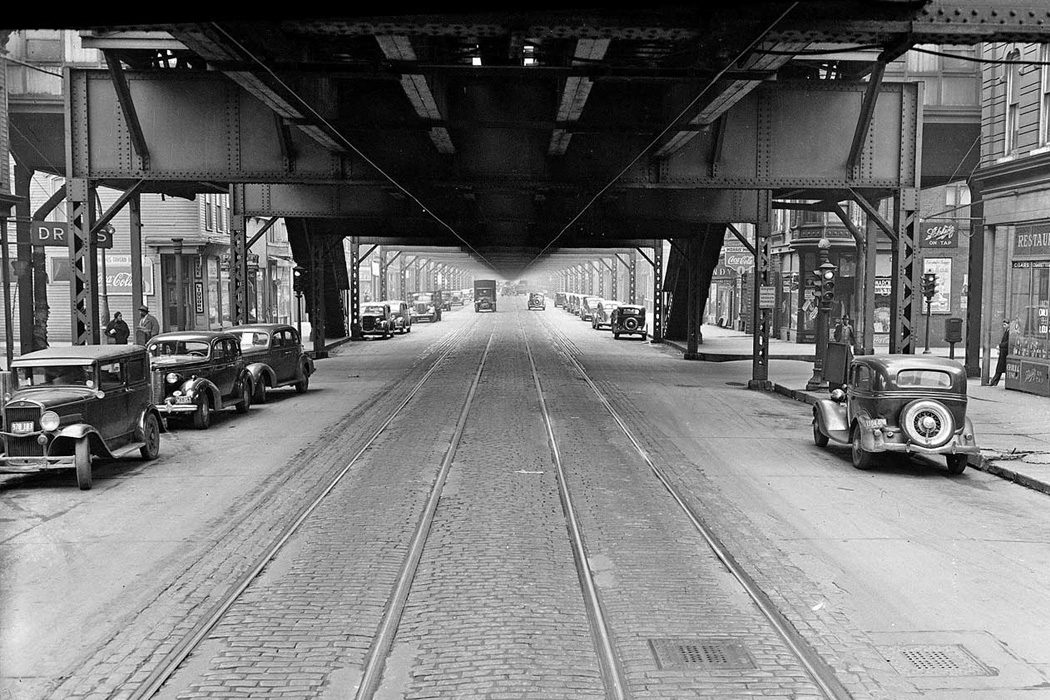The first story I remember hearing about my Aunt Ruth was from the childhood she shared with my mother. “She used to take a taxi home from school!” Mom said. Mom was the older sibling—the only sibling—and so, like me in obligations due to birth order, she was required to take care of the younger one. “Starting in first grade she’d say, ‘I don’t want to walk home. I’m going to hail a cab.’” Until I was 12, I lived only in villages and had no concept of what it meant to “hail a cab” the first few times I heard this story. When we visited Grandma in Chicago where Mom and Ruth grew up and I saw the cars with lights on top I finally understood. We had taken the El from Grandma’s house to go shopping, and now our arms were full of packages.
“Shall we hail a cab?” my mother asked her mother.
Grandma looked at her askance. “Of course not. It costs too much.”
It cost too much in the thirties, too, when Ruthie took it into her head not to walk home with her older sister. Evie, my mother, told her, “You can’t do that. We don’t have enough money. Cabs are for emergencies.”
I don’t think Ruth ever took Evie’s authority seriously. I’ve seen that look Evie gets, when she’s trying to be in charge but her charges won’t be herded into obedience. Still I wonder…was there a moment when she too wanted to get into the cab, joyride back home instead of walking the seven blocks? If it were I, the story might have gone: “Of course I had to go with her, to keep her safe. But it was her idea.’”
But Evie just stood on Wabash Avenue and watched as Ruthie waved her arm and the taxi stopped and Ruthie’s Buster Browns and school dress and Ruthie herself disappeared inside it.
Grandma made sure they knew their address before they went to school. I know that part of the story. What I don’t know: was Evie scared for her sister? Was Ruthie scared?
My mother died two years ago and Aunt Ruth died last week. There’s no one I can ask.
My grandmother worked at the post office and my grandfather worked from home. He was a writer and photographer and disabled. Like me. He was dependent on other people. Like me.
He was the one waiting for his daughters to come home from school. Although Ruthie was pretty sure she could talk the cabbie into letting her ride for free, her Dad was her back up.
By the time she was old enough for school, Ruthie had great confidence in her cuteness. It would get her through; it would mean she didn’t have to pay any price at all.
My mother expected Ruthie to be in big trouble when she got home from school ahead of her older sister. Evie thought she also might be in hot water for not preventing Ruthie from taking the cab; that was what she worried about on her way home, the first time Ruthie took the taxi.
Sure enough, Ruthie convinced the cabbie to let her ride for free. Their Dad wasn’t mad at either girl, just not surprised that Evie would be the one to follow the rules and Ruthie the one to finesse a way around them. It made a good story to tell Mother when she got home from work.
I don’t know how many times Ruthie rode the cabs for free. Maybe 10. Maybe a hundred. It was something she did repeatedly, all through school. She never had to pay.
Pretty soon, while she was still in first grade, Ruth had a regular cabbie who would look out for her and give her rides. “Why didn’t you ride, too?” I asked my mother, on one of her many repetitions of the story.
“Oh, I didn’t think it was right,” she said. “I thought Ruthie was nervy. I kind of admired it, but we were supposed to walk home from school. Mother would have smacked her good for it, if Dad wasn’t such a softie. Ruthie got away with lots of things.”
“Remember how we started trading off, bribing each other not to tell our parents what they didn’t need to know?” Ruthie is visiting our family, with her children but without her husband. She does that a lot. She and my mother are in their forties now.
“You were such a tattle tale,” Mom complained. “You would tell Mother when I was reading under the covers at night.” She turned to me. “That’s about as wild as I got.”
“It’s probably why you had to wear glasses and I didn’t.” Ruth’s voice is breezy, teasy. “All that reading in improper lighting.”
As I write this, a few days after her death, these words distress me. Ruthie never had to pay. The same taxi driver gave her rides over and over. Did my grandparents ever meet him? Nowhere in the story, all the times I heard it, did anyone suggest that anything bad happened. My mother talks of big cities, Chicago in particular, as being dangerous. But mostly, when I ask her, “Dangerous how?” it means anti-Semitism. Was there another danger?
My mother and her sister remained close throughout their lives. When the lights were out, did Ruth ever whisper to her sister something that had happened in the taxis? No, she wouldn’t have done that. She wouldn’t have endangered the freedom, the exhilaration of riding in that cab, leaving behind her everyday life. Just like I never told my parents that a stranger raped me the day that my bike broke down. I was nine. Riding my bike was the best thing in my life. I knew they’d take it away from me if they found out. When I finally told them, 40 years later, my mother said, “We shouldn’t have let you take those bike hikes. I thought it was safe, living in such a small town, away from all those things.”
My father asked, “What were you wearing?”
I hope Ruthie’s cab rides were wonderful, that all the cabbies who picked her up treated her well. I want the world to be a kind place.
Ruthie was 96, the same age as my mother when she died, and in the same month. Evie followed the rules, went first. Ruthie hailed the cab.




